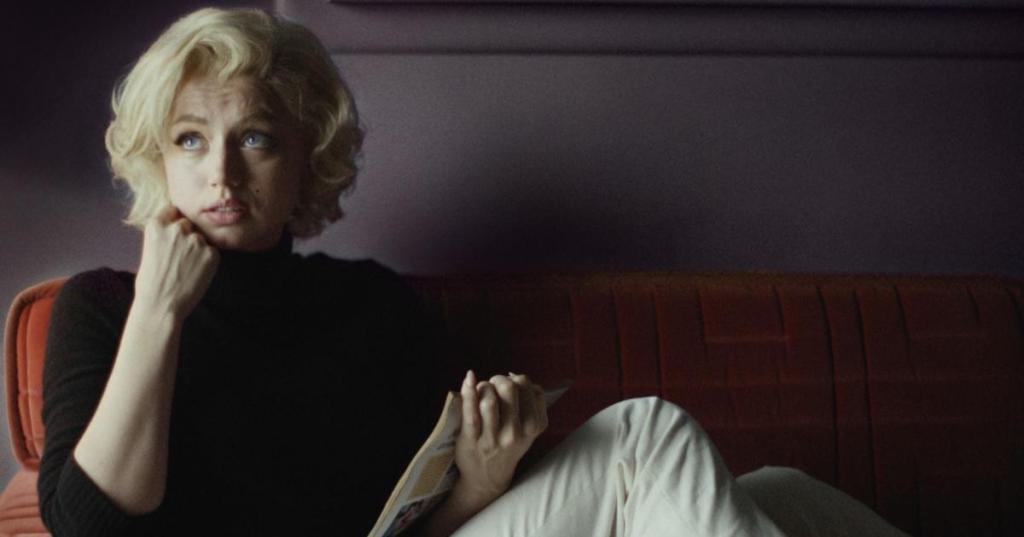Marilyn Monroe was a real person who starred in many great Hollywood movies for over a decade. Since her untimely death in 1962, she’s become this mythic figure of American pop culture, almost to the point where it’s surprising to remember she was real. The life story of Norma Jeane Mortenson is considered a prime example of the dangers of celebrity, how one moment a star can be on top of the world, and the next moment, they’re struggling to survive. Joyce Carol Oates’ novel Blonde fictionalized Monroe’s life, molding it to fit a portrait of a celebrity who only experienced pain. Oates’ Monroe knows no happiness and Andrew Dominik’s epic adaptation of the novel drives home the point. Ana de Armas’ effervescent performance as Monroe peeks through the darkness, but it’s hard to do so under a mountain of horror.
Blonde goes with the birth-to-death structure, starting with a young Norma Jeane (Lily Fisher) being horrified by the actions of her mother, Gladys (Julianne Nicholson), who has also convinced her daughter that her absent father is a powerful man in Hollywood. This establishes the film’s only foundation, Monroe’s desperate search for a father figure in her life. It’s why she calls her husband – first Joe DiMaggio (Bobby Cannavale) and then Arthur Miller (Adrien Brody) – “daddy.” It’s why she’s also desperate to become a loving mother, to prove that even though she came from a broken home, she can raise a child herself.
Videos by PopCulture.com

Dominik is more concerned with the impact celebrity has on Monroe, and how every single person she ever knew was selfish and used her for their own means (at least, in this fictional version of her life). She becomes a star, not because she has talent, but because Fox executives want a sexy bombshell on screen. She has no friends and is only surrounded by people who insist on calling her Marilyn instead of Norma. She is trapped by “Marilyn Monroe,” and in an endless pursuit of more people who will call her “Norma Jeane.” But she never finds that. Even when Miller agrees to call her whatever she wants, he still comes up with another moniker and agrees to call her Marilyn in public.
The only shining spot in this whole affair is de Armas. Her transformative performance as Marilyn is shocking. De Armas nearly disappears into Marilyn during some scenes, and is almost indistinguishable from the real thing. Yet, you’re still aware de Armas is there. That’s part of the movie. At every level, people are performing the versions of themselves that they think people want to see, but the veneer is thin enough that we can tell. De Armas makes it very clear that she’s not playing the real Marilyn, but a new version she and Dominik developed together. It would have been nice if Dominik gave de Armas a chance to use this Marilyn to bring out the skills the real one had. Dominik shows no interest in reminding us that Marilyn was a very talented actress. Aside from a few fleeting references, there is little mention of her desire to better her skills.
Dominik turns Blonde into a visual spectacle. The movie switches aspect ratios at seemingly random moments, with some changes clearly meant to box Marilyn in. There’s a fantastic scene during her marriage to Miller where she is trying to distance herself from him, but the camera pulls in. As it does so, the image gets smaller and smaller, with Miller pushing Marilyn to the edge of the kitchen counter. It’s the only effective use of the aspect ratio switches in the film.
Dominik also moves between black and white and color photography. Unfortunately, this doesn’t quite work that well. The movie has a very digital feel to it, at least on the small screen, and it makes the overly polished color scenes look more like de Armas’ Estée Lauder commercials. The black and white scenes are by far the best-looking moments in the film, with cinematographer Chayse Irvin recreating some famous images from Marilyn’s life.
Blonde does have something in its DNA that is great, and that is only de Armas’ performance. Monroe’s story could inspire a very deep and intricate look at the dangers of celebrity and losing oneself in a persona others built for you. But Blonde focuses so much on the pain Monroe faced in real life that it makes for a dire and difficult film to experience. There’s no safety for Marilyn in this movie and, just as Aaron Sorkin showed no respect for his subject’s work in Being the Ricardos, Dominik dismisses Monroe’s excellent films. The filmmaker is relentless in delivering pain, stripping Monroe of the very assets she so desperately wanted the world to see. Blonde will be released on Netflix, Wednesday, Sept. 28.








